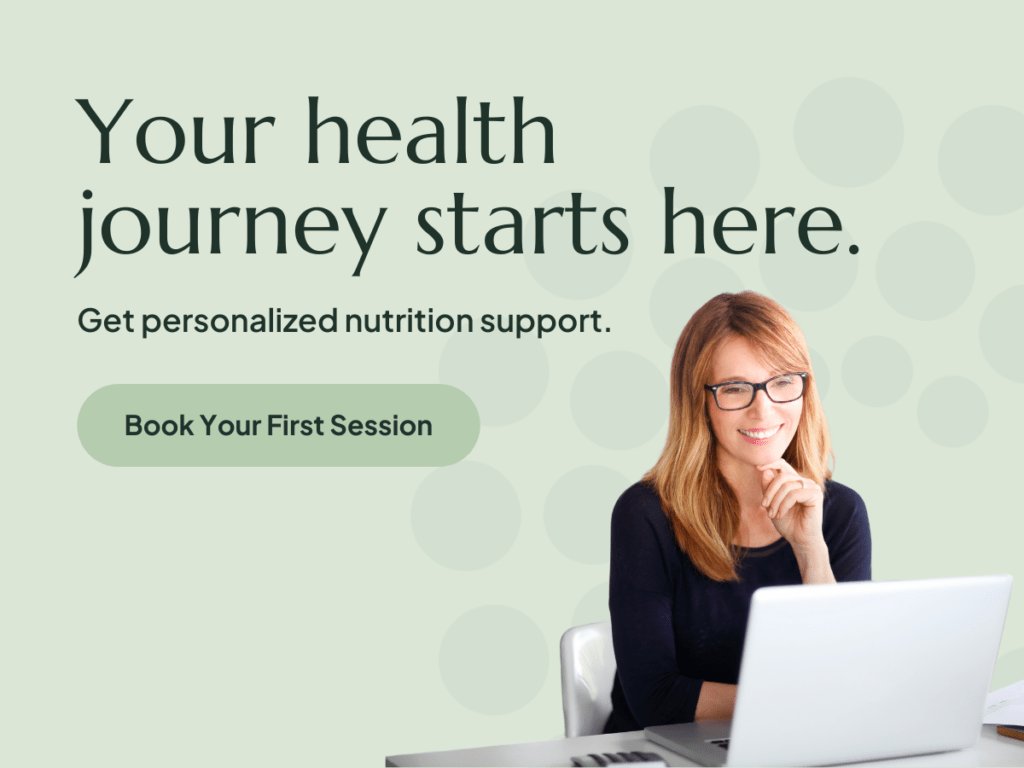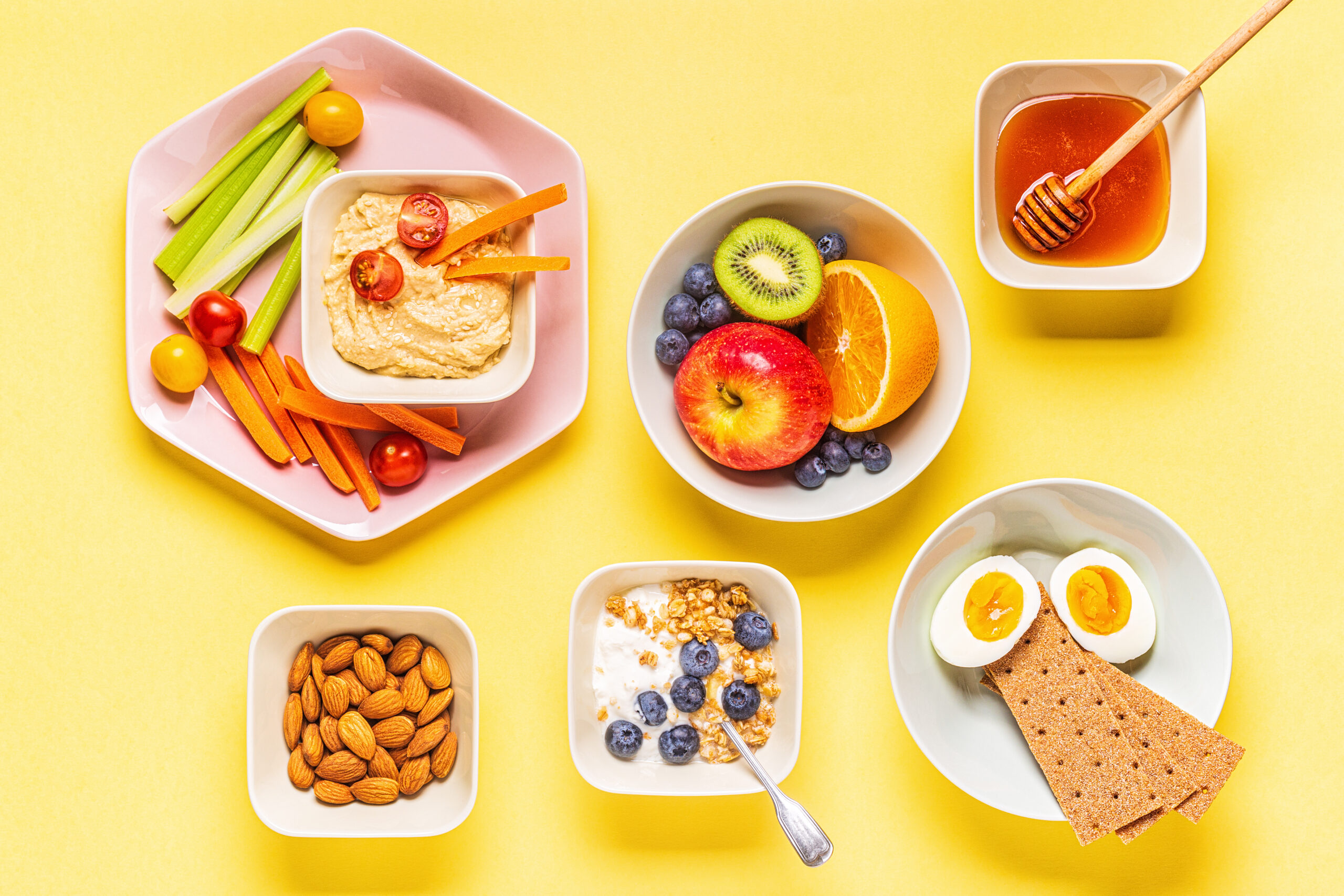Eating a balanced, nutrient-dense diet after giving birth supports recovery, boosts your health, and improves energy levels. If you’re breastfeeding, good nutrition is key to meeting the increased needs of both you and your baby. Many women feel pressure to return to their pre-pregnancy bodies, but we encourage new moms to focus on nourishing their bodies instead. Think about adding nutrients to your diet rather than what to cut out.
- A balanced diet aids recovery, enhances health, and boosts energy levels for new moms.
- Incorporating whole, nutrient-dense foods is essential for postpartum nutrition.
- Focus on hydration to meet increased needs, especially when breastfeeding.
- Try eating small, frequent meals to maintain energy and stabilize blood sugar.
- Consider individualized nutrition plans to support breastfeeding and overall health.
The postpartum period brings joy, but can also be mentally and physically challenging. Figuring out what to eat may feel overwhelming, but it doesn’t have to be. Prioritizing your nutrition can be simple and manageable. Our team of Registered Dietitian Nutritionists has put together some top tips to help you optimize your postpartum nutrition.
Incorporate whole, nutrient dense foods
A healthy diet rich in fruits, vegetables, whole grains, legumes, healthy fats, and proteins is the goal. But don’t stress about having a perfectly portioned, balanced plate every time. Instead, focus on adding whole, nutrient-dense foods when you can.
Here are some examples of easy ways to add more nutrients to your meals and snacks:
Fruits and vegetables
Eat the rainbow! Fruits and veggies are hydrating, and packed with vitamins, minerals, and antioxidants.
- Keep ready-to-eat fresh fruit on your kitchen counter and in the fridge for snacking
- Wash and cut up fresh veggies and keep it in tupperware in your fridge (try cucumbers, carrots, bell peppers, snap peas). Pair with your favorite dip (think guacamole, hummus, tzatziki, salsa), and some whole wheat or seed crackers.
- Buy salad kits to toss together as a side, or add protein and carbs to make a meal
- Stock your freezer with frozen fruits and veggies: Add veggies to pasta sauce, stir fry dishes, egg scrambles, or soups and stews.
- Add fruit to oatmeal, smoothies or yogurt bowls
- Incorporate smoothies with fruits and veggies for an easy and quick way to get a nutrient boost
Smoothie recipe: 1 cup of unsweetened almond milk (or any milk of your choice), 1 cup of frozen veggies (try spinach, kale or frozen cauliflower), ½ cup Greek yogurt, ½ cup of frozen mixed berries, 1 small banana, 1 tbsp peanut or almond butter, 1 tbsp chia seeds (option to add a scoop of protein powder)
Healthy fats
Incorporating healthy fats helps to keep you satiated, is important in hormone regulation, and can boost your omega-3 fatty acid intake. Omega-3s act as an antioxidant to mitigate inflammation, and are particularly important for women who are breastfeeding to support the neural development of your baby.
- Mix together a container of homemade trail mix with a mix of your favorite nuts, seeds, and dried fruit (and some dark chocolate pieces if you’re craving something sweet!)
- Add chia or flaxseed to smoothies, oatmeal, or yogurt bowls
- Add peanut or almond butter to fruit (like a banana or apple) for a snack
- Cook with olive oil or avocado oil
- Add nuts and olives to snack plates
- Add avocado to toast and eggs (or try frozen avocado chunks in smoothies)
- Incorporate fatty fish like salmon (try smoked or canned salmon for an easy, no cook option)
Whole grains
Whole grains provide carbohydrates, the body’s preferred source of energy. They also contain fiber, which is important for keeping you satiated, promoting bowel regularity and stabilizing blood sugar.
- Stock your pantry with whole grains including: whole wheat products (think crackers, bread, wraps, pasta), legume pasta, brown rice, quinoa, farro, oats/oatmeal, high fiber/lower sugar cereals
- Batch cook a large portion of grains to have on hand for the week (add to salads, grain bowls, soups/stews, or consider the microwavable grain packets available at most grocery stores
- Put an egg scramble with veggies on a whole wheat wrap
- Experiment with different sandwich and wrap combinations using whole wheat products
Protein
Protein is responsible for the repair and synthesis of muscles, tissues, and cells which is essential to support post-delivery recovery. Additionally, protein regulates certain hormones and makes enzymes, and hemoglobin, the protein that delivers oxygen throughout the body. Adding protein to meals and snacks also helps to keep you fuller for longer.
Keep easy-to-cook or ready-to-eat protein-rich foods on hand. Try batch-cooking hard-boiled eggs for quick snacks. Stock up on canned beans, lentils, frozen bean or turkey burgers, and store-bought rotisserie chicken. Other good options include canned salmon or tuna, canned lentil or veggie soup, single-serve cheeses like string cheese, and sliced deli turkey (yes, it’s safe to eat deli meat again, even if you’re breastfeeding!). You can also include Greek yogurt, cottage cheese, and protein powder.

Try small, frequent meals
Sticking to a regular meal schedule with a newborn can be hard. Instead, try eating 4 to 6 mini-meals or snacks throughout the day. Focus on high-fiber carbs, protein, and healthy fats to keep your blood sugar steady and energy levels up. This combination will also keep you fuller for longer. For example, try Greek yogurt (protein) with 2 tablespoons of nuts, seeds, or nut butter (healthy fats) and fruit (high-fiber carbs). For a savory option, pair hard-boiled eggs (protein) with mashed avocado (healthy fats) on a whole wheat English muffin (high-fiber carb).
Focus on hydration
Adequate hydration during the postpartum period is essential for vitality, especially if you are breastfeeding, as your hydration needs go up. It is recommended that breastfeeding women consume a total of 16 cups (or 128 ounces) from both food and beverages per day. We recommend having a large water bottle that you refill throughout the day, for convenience and tracking your intake.
Try adding flavorings to your water like citrus fruits or frozen berries and tropical fruits. Sparkling water and decaffeinated teas, as well as hydrating fruits and vegetables all contribute to your water intake as well. You can also try flavored electrolyte packets that contain sodium, potassium and carbohydrates to help replenish losses and rehydrate you faster. However, you don’t want to overdo these — in general, our body does a good job of maintaining an optimal electrolyte balance, so stick to one serving of electrolyte powder if you opt to include it (unless otherwise directed by your physician).
Specific Needs For Breastfeeding Moms
The mother’s diet can influence both the quantity and nutritional quality of the breast milk, so focusing on a nutrient dense diet will benefit both you and your baby. In addition to the above recommendations, here are some specific nutritional recommendations for breastfeeding mothers to consider:
Increased calorie needs
- 1-6 months: Add 330 calories/day
- 6-12 months: Add 400 calories/day
Increased recommended dietary allowance (RDAs) and AIs (Adequate Intake Levels) for nutrients
- Choline: 550 milligrams/day
- Folate/Folic acid: 500 mcg
- Omega-3s: Recommended intake of 8-12 ounces of fish per week to get enough omega-3. To learn more about limiting your mercury exposure, download this FDA factsheet. If you do not eat fish, you may want to consider and omega-3 DHA/EPA supplement.
- Iodine: 290 micrograms
- Iron: While iron needs increase to 27 milligrams during pregnancy, they actually drop 9-10 milligrams during lactation. If you are looking to continue your prenatal vitamin postpartum while you are breastfeeding, this is something to consider, as you don’t want to exceed your iron needs.
If you are unable to meet these needs from food alone, you may want to consider supplementation. Note that while the nutritional needs vary slightly in pregnancy compared to postpartum needs, some physicians recommend you continue to take your prenatal vitamins while lactating, as most incorporate the above nutrients. We recommend working with a dietitian to assess your nutrient intake and guide you on supplementation as needed.
Considerations for alcohol and caffeine
Alcohol: If you choose to drink alcohol while breastfeeding, up to one drink per day and waiting two hours before nursing or pumping after drinking is generally recognized as safe. Keep in mind that if you drink more than one drink, it extends the time that alcohol can be detected in breastmilk, so you may need to wait longer to feed or pump. You can also use testing strips to detect alcohol in expressed breast milk.
Coffee: A small amount of caffeine can pass from the mother to baby through breastmilk. However, when the mother consumes moderate amounts of caffeine (defined as 300 milligrams, which is about 2 to 3 cups of coffee) or less, it is generally recognized as safe.
The Bottom Line on Postpartum Nutrition
The key is to take it slow, and look for opportunities to add nourishment to your plate when possible. Remember that eating regularly scheduled meals, and executing perfectly balanced plates is likely not realistic, so do what you can to add whole, nutrient dense foods to your diet. We encourage you to see nutrition and healthy eating as one element of your self care routine that can help to improve your energy levels, sleep, mood and overall health! If you are breastfeeding, be sure to consider the specific nutrient recommendations and guidelines we’ve outlined.
Have more questions about postpartum nutrition? Work with a Culina Health registered dietitian nutritionist to get personalized virtual nutrition care that is covered by insurance. Book a session to get started!





